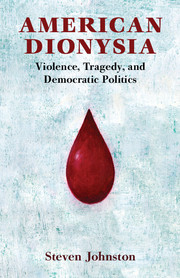Book contents
- Frontmatter
- Contents
- Acknowledgments
- Introduction: There Will Be Blood: Antinomies of Democracy
- 1 American Dionysia
- 2 Democracy at War with Itself: Citizens
- 3 Democracy at War with Itself: Animals
- 4 Forcing Democracy to Be Free: Rousseau to Springsteen
- 5 Two Cheers for Democratic Violence
- 6 New Tragic Democratic Traditions
- Conclusion: Democracy's Tragic Affirmations
- Notes
- Bibliography
- Index
6 - New Tragic Democratic Traditions
Published online by Cambridge University Press: 05 May 2015
- Frontmatter
- Contents
- Acknowledgments
- Introduction: There Will Be Blood: Antinomies of Democracy
- 1 American Dionysia
- 2 Democracy at War with Itself: Citizens
- 3 Democracy at War with Itself: Animals
- 4 Forcing Democracy to Be Free: Rousseau to Springsteen
- 5 Two Cheers for Democratic Violence
- 6 New Tragic Democratic Traditions
- Conclusion: Democracy's Tragic Affirmations
- Notes
- Bibliography
- Index
Summary
We must deal with all that lies before us. The future rests with the ones who tend the future. No more prayers now. For mortal men there is no escape from the doom we must endure.
Sophocles, AntigoneBut crushing truths perish from being acknowledged … I leave Sisyphus at the foot of the mountain! One always finds one's burden again.
Albert Camus, The Myth of SisyphusDemocracy, the preceding chapters demonstrated, is conversant with violence. In the United States, violence is not only practiced, especially by the state, it is openly celebrated. The celebration, however, is not understood as such. Democracy is deeply invested in a peaceful, nonviolent reputation and disavows the violence and damage it habitually dispenses. Rather, democracy understands itself as a locus of right and source of good in the world, leaving it vulnerable to enemies foreign and domestic who take advantage of it at moments of their choosing. Democracy is also devoted to confirming and consolidating its reputation through a network of national holidays, patriotic memorials, public rituals, commemorative ceremonies, and civic orations that attest to the wars it has fought for the ideals it symbolizes and the costs it has incurred as the last best hope on earth. Not surprisingly, then, the United States may have reached a new pinnacle regarding democracy's celebration of violence in the aftermath of the events of September 11, 2001.
Nevertheless, there is an opportunity here to re-cover and re-invent the communal machinery responsible for marking and honoring American ascendancy and triumphalism (victimization), sacrifice and loss (ressentiment), and resilience and perseverance (right of retribution). Following the example of Chapters 1 through 4, I introduce a new set of popular holidays, monuments, memorials, and commemorative occasions, including Democracy Day, September 11, which features three dedicatory odes that celebrate democracy as a daring political adventure and experiment ready to take chances on its own behalf free of existential bitterness in a world of tragic possibilities and opportunities: an Ode to Democracy, an Ode to the Enemy, and an Ode to Life Itself.
- Type
- Chapter
- Information
- American DionysiaViolence, Tragedy, and Democratic Politics, pp. 194 - 239Publisher: Cambridge University PressPrint publication year: 2015



